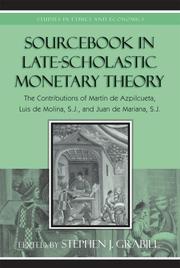| Listing 1 - 6 of 6 |
Sort by
|
Book
Year: 1974 Publisher: Roma : Spokane : Institutum Historicum S.I. ; Gonzaga University Press,
Abstract | Keywords | Export | Availability | Bookmark
 Loading...
Loading...Choose an application
- Reference Manager
- EndNote
- RefWorks (Direct export to RefWorks)
Book
ISBN: 9780310516972 0310516978 Year: 2015 Publisher: Grand Rapids, Michigan Zondervan
Abstract | Keywords | Export | Availability | Bookmark
 Loading...
Loading...Choose an application
- Reference Manager
- EndNote
- RefWorks (Direct export to RefWorks)
Spanish theologian Luis de Molina is enjoying a quiet resurgence among Protestant scholars -- a belated appreciation, perhaps, for the Reformation-era Jesuit who in his lifetime never launched a theological movement comparable to those of his contemporaries Calvin and Arminius. In the first full-length work ever published on this seminal thinker, author Kirk R. MacGregor's Luis de Molina explores the development and original contributions -- above all the doctrine of God's "middle knowledge" -- of the brilliant philosophical theologian. - Jacket.
Molinism --- God (Christianity) --- Omniscience --- Molina, Luis de,
Book
ISBN: 9789004228238 9789004262188 9004262180 1306318769 9781306318761 9004228233 Year: 2014 Volume: 50 Publisher: Leiden Brill
Abstract | Keywords | Export | Availability | Bookmark
 Loading...
Loading...Choose an application
- Reference Manager
- EndNote
- RefWorks (Direct export to RefWorks)
Since his rediscovery by Alwin Plantinga in the 1970s, the possibility of counterfactuals of freedom in Molinism has become one of the main issues in the contemporary analytic philosophy of religion. Notwithstanding this, Luis de Molina (1535-1600) remains one of the most influential and least known authors of late scholasticism and early modern philosophy. The papers collected in this volume treat the whole range of issues posed by his metaphysics as set out in his revolutionary 'Concordia' and in his practical philosophy - especially concerning law and economics - in his groundbreaking work 'De Justitia et Jure'. They also examine Molina's historical commitments and his influences on philosophy. In this way this Companion offers the first comprehensive and thorough overview of Molina's thought.
Molina, Luis de, --- Molina, Ludovicus, --- De Molina, Luis,

ISBN: 9780739117507 Year: 2007 Publisher: Lanham Lexington books
Abstract | Keywords | Export | Availability | Bookmark
 Loading...
Loading...Choose an application
- Reference Manager
- EndNote
- RefWorks (Direct export to RefWorks)
Economics --- Money --- Moral and ethical aspects --- De Azpilcueta, Martinus --- Mariana, Juan de, --- Molina, Luis de,
Book
ISBN: 3653961882 3653068193 Year: 2016 Publisher: Frankfurt am Main, [Germany] : Peter Lang Edition,
Abstract | Keywords | Export | Availability | Bookmark
 Loading...
Loading...Choose an application
- Reference Manager
- EndNote
- RefWorks (Direct export to RefWorks)
If God knows human actions in advance, do humans really have freedom of choice? Throughout the centuries various solutions have been offered as to how to retain or reconcile both the concepts of divine omniscience and human freedom. One solution focuses on the idea of middle knowledge. This theory originates with the Spanish Jesuit Luis de Molina, was contested by Reformed theologians such as Herman Bavinck, and makes a remarkable comeback among present-day analytical philosophers such as William Lane Craig. Apart from a wealth of philosophical considerations, the appeal to biblical texts also plays an important role in the work on middle knowledge by each of these thinkers. The book examines their writings and investigates how contemporary biblical scholars interpret the biblical texts used by them. The author elaborates a creative proposal as to how these gained insights apply to the theory of middle knowledge and what this means for our overall evaluation of this theory.
Molinism. --- Free will and determinism --- Religious aspects --- Christianity. --- Molina, Luis de, --- Bavinck, Herman, --- Craig, William Lane.
Book
ISBN: 9789004202252 9004202250 9786613120915 1283120917 9004209662 9789004209664 Year: 2011 Volume: 152 Publisher: Leiden Brill
Abstract | Keywords | Export | Availability | Bookmark
 Loading...
Loading...Choose an application
- Reference Manager
- EndNote
- RefWorks (Direct export to RefWorks)
Luis de Molina (1535-1600) was the first scholastic doctor to legitimize the practice of money lending as a career. His De Iustitia et Iure offers a thorough description of trade practices of the vibrant economies of Portugal and Spain in the Sixteenth Century. This detailed analysis allows him to provide a moral assessment of these practices. His treatise is a capital example of how a deep commitment to received tradition and to contemporary economic issues can advance economic science and perfect moral theology through a better understanding of reality. This book shows how threads of field research, economic reflection, natural law tradition, casuistry and the quest for justice may weave together to form a major work of Catholic moral theology.
Economics --- Christian ethics --- Religious aspects --- Catholic Church. --- Catholic authors. --- Molina, Luis de, --- Thomas, --- Economic analysis of law --- Molina, de, Luis --- -Christian ethics --- -#GBIB: jesuitica --- 241.65 --- 241.65 Theologische ethiek: rechtvaardigheid--(zie ook {330.86}) --- Theologische ethiek: rechtvaardigheid--(zie ook {330.86}) --- Ethical theology --- Moral theology --- Theology, Ethical --- Theology, Moral --- Christian life --- Christian philosophy --- Religious ethics --- Economic theory --- Political economy --- Social sciences --- Economic man --- -Catholic Church. --- #GBIB: jesuitica --- Catholic authors --- Religious aspects&delete& --- Catholic Church --- Economics - Religious aspects - Catholic Church. --- Christian ethics - Catholic authors. --- Molina, Luis de, - 1535-1600. - De justitia et jure. --- Thomas, - Aquinas, Saint, - 1225?-1274. - Summa theologica. - Secunda secundae. - Quaestio 57-79.
| Listing 1 - 6 of 6 |
Sort by
|

 Search
Search Feedback
Feedback About UniCat
About UniCat  Help
Help News
News